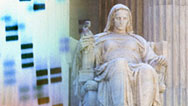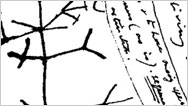The Judge Speaks
- Posted 11.01.07
- NOVA
The 2005 trial of Kitzmiller v. Dover was a major bout in the battle over the teaching of evolution. The crux of the case was a Dover, Pennsylvania school distract policy requiring that students hear a disclaimer that "gaps" exist in Darwin's theory. It also introduced an idea called intelligent design (ID). Was Dover's ID policy a covert way to put religion into a public school? Following six weeks of testimony from leading biologists as well as from ardent supporters of ID, Judge John Jones issued a 139-page ruling on the case. Here, Judge Jones reads some of his key findings.
 Listen
Printable Version
Listen
Printable Version
Hear Judge John Jones read key excerpts from a landmark court case on the teaching of evolution.
Transcript
ID is not science
After a searching review of the record and applicable case law, we find that while intelligent design arguments may be true, a proposition on which the Court takes no position, intelligent design is not science. We find that intelligent design fails on three different levels, any one of which is sufficient to preclude a determination that intelligent design is science. They are: (1) intelligent design violates the centuries-old ground rules of science by invoking and permitting supernatural causation; (2) the argument of irreducible complexity, central to intelligent design, employs the same flawed and illogical contrived dualism that doomed creation science in the 1980s; and (3) intelligent design's negative attacks on evolution have been refuted by the scientific community. It is additionally important to note that intelligent design has failed to gain acceptance in the scientific community, it has not generated peer-reviewed publications, nor has it been the subject of testing and research.
ID is the progeny of creationism
The evidence at trial demonstrates that intelligent design is nothing less than the progeny of creationism. What is likely the strongest evidence supporting the finding of intelligent design's creationist nature is the history and historical pedigree of the book to which students in Dover's ninth-grade biology class are referred, Of Pandas and People. Pandas is published by an organization called FTE, as noted, whose articles of incorporation and filings with the Internal Revenue Service describe it as a religious, Christian organization. Pandas was written by Dean Kenyon and Percival Davis, both acknowledged creationists, and Nancy Pearcey, a Young Earth Creationist, contributed to the work.
Evolutionary theory is not antithetical to religion
Both Defendants and many of the leading proponents of intelligent design make a bedrock assumption which is utterly false. Their presupposition is that evolutionary theory is antithetical to a belief in the existence of a supreme being and to religion in general. Repeatedly in this trial, Plaintiffs' scientific experts testified that the theory of evolution represents good science, is overwhelmingly accepted by the scientific community, and that it in no way conflicts with, nor does it deny, the existence of a divine creator.
The disclaimer Dover wanted read to students is flawed
The disclaimer written by the Dover School Board singles out the theory of evolution for special treatment, misrepresents its status in the scientific community, causes students to doubt its validity without scientific justification, presents students with a religious alternative masquerading as a scientific theory, directs them to consult a creationist text as though it were a science resource, and instructs students to forego scientific inquiry in the public school classroom and instead to seek out religious instruction elsewhere.
The goal of the ID movement is to foment a revolution
Intelligent design, as noted, is grounded in theology, not science. Accepting for the sake of argument its proponents' as well as Defendants' argument that to introduce intelligent design to students will encourage critical thinking, it still has utterly no place in a science curriculum. Moreover, intelligent design's backers have sought to avoid the scientific scrutiny which we have now determined that it cannot withstand by advocating that the controversy, but not intelligent design itself, should be taught in science class. This tactic is at best disingenuous, and at worst a canard. The goal of the intelligent-design movement is not to encourage critical thought but to foment a revolution which would supplant evolutionary theory with intelligent design.
It is unconstitutional to teach ID as an alternative to evolution
We do not question that many of the leading advocates of intelligent design have bona fide and deeply held beliefs which drive their scholarly endeavors. Nor do we controvert that intelligent design should continue to be studied, debated, and discussed. As stated, our conclusion today is that it is unconstitutional to teach intelligent design as an alternative to evolution in a public school science classroom.
Credits
Image Credits
- (Judge Jones)
- © Ian Bradshaw Photography
- (courthouse)
- © Alan Schein/zefa/Corbis
Related Links
-

Board vs. Teachers
Read the Dover School Board's controversial disclaimer on evolution and the memo science teachers wrote in response.
-

Intelligent Design on Trial
Science is "Exhibit A" in a landmark trial on the teaching of evolution.
-

NOVA and Intelligent Design
Paula Apsell explains why and how NOVA took on the contentious issues behind a landmark court case.
-

Darwin's Predictions
Over 150 years later, science continues to confirm most of Darwin's conjectures.
You need the Flash Player plug-in to view this content.

